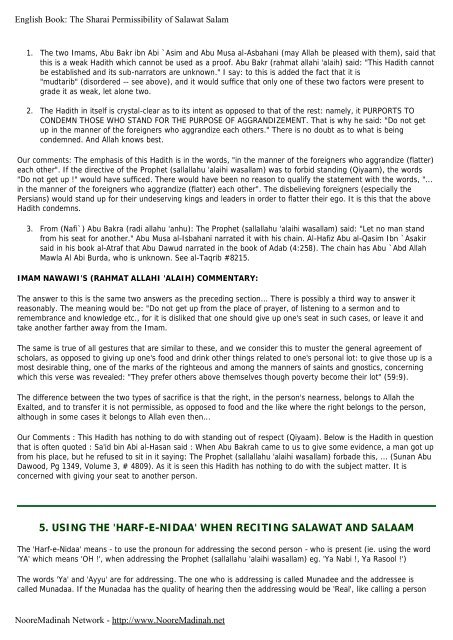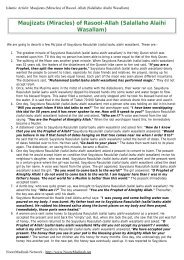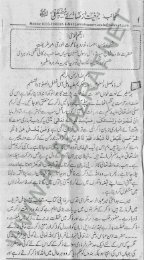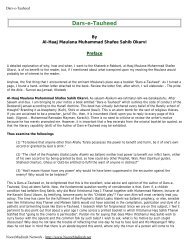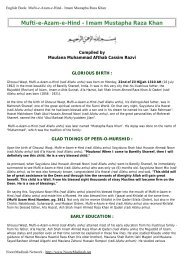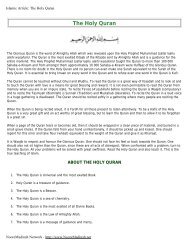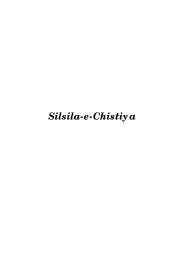The Sharai Permissibility of Salawat & Salam - Noore Madinah ...
The Sharai Permissibility of Salawat & Salam - Noore Madinah ...
The Sharai Permissibility of Salawat & Salam - Noore Madinah ...
Create successful ePaper yourself
Turn your PDF publications into a flip-book with our unique Google optimized e-Paper software.
English Book: <strong>The</strong> <strong>Sharai</strong> <strong>Permissibility</strong> <strong>of</strong> <strong>Salawat</strong> <strong>Salam</strong><br />
1. <strong>The</strong> two Imams, Abu Bakr ibn Abi `Asim and Abu Musa al-Asbahani (may Allah be pleased with them), said that<br />
this is a weak Hadith which cannot be used as a pro<strong>of</strong>. Abu Bakr (rahmat allahi 'alaih) said: "This Hadith cannot<br />
be established and its sub-narrators are unknown." I say: to this is added the fact that it is<br />
"mudtarib" (disordered -- see above), and it would suffice that only one <strong>of</strong> these two factors were present to<br />
grade it as weak, let alone two.<br />
2. <strong>The</strong> Hadith in itself is crystal-clear as to its intent as opposed to that <strong>of</strong> the rest: namely, it PURPORTS TO<br />
CONDEMN THOSE WHO STAND FOR THE PURPOSE OF AGGRANDIZEMENT. That is why he said: "Do not get<br />
up in the manner <strong>of</strong> the foreigners who aggrandize each others." <strong>The</strong>re is no doubt as to what is being<br />
condemned. And Allah knows best.<br />
Our comments: <strong>The</strong> emphasis <strong>of</strong> this Hadith is in the words, "in the manner <strong>of</strong> the foreigners who aggrandize (flatter)<br />
each other". If the directive <strong>of</strong> the Prophet (sallallahu 'alaihi wasallam) was to forbid standing (Qiyaam), the words<br />
"Do not get up !" would have sufficed. <strong>The</strong>re would have been no reason to qualify the statement with the words, "...<br />
in the manner <strong>of</strong> the foreigners who aggrandize (flatter) each other". <strong>The</strong> disbelieving foreigners (especially the<br />
Persians) would stand up for their undeserving kings and leaders in order to flatter their ego. It is this that the above<br />
Hadith condemns.<br />
3. From (Nafi`) Abu Bakra (radi allahu 'anhu): <strong>The</strong> Prophet (sallallahu 'alaihi wasallam) said: "Let no man stand<br />
from his seat for another." Abu Musa al-Isbahani narrated it with his chain. Al-Hafiz Abu al-Qasim Ibn `Asakir<br />
said in his book al-Atraf that Abu Dawud narrated in the book <strong>of</strong> Adab (4:258). <strong>The</strong> chain has Abu `Abd Allah<br />
Mawla Al Abi Burda, who is unknown. See al-Taqrib #8215.<br />
IMAM NAWAWI'S (RAHMAT ALLAHI 'ALAIH) COMMENTARY:<br />
<strong>The</strong> answer to this is the same two answers as the preceding section... <strong>The</strong>re is possibly a third way to answer it<br />
reasonably. <strong>The</strong> meaning would be: "Do not get up from the place <strong>of</strong> prayer, <strong>of</strong> listening to a sermon and to<br />
remembrance and knowledge etc., for it is disliked that one should give up one's seat in such cases, or leave it and<br />
take another farther away from the Imam.<br />
<strong>The</strong> same is true <strong>of</strong> all gestures that are similar to these, and we consider this to muster the general agreement <strong>of</strong><br />
scholars, as opposed to giving up one's food and drink other things related to one's personal lot: to give those up is a<br />
most desirable thing, one <strong>of</strong> the marks <strong>of</strong> the righteous and among the manners <strong>of</strong> saints and gnostics, concerning<br />
which this verse was revealed: "<strong>The</strong>y prefer others above themselves though poverty become their lot" (59:9).<br />
<strong>The</strong> difference between the two types <strong>of</strong> sacrifice is that the right, in the person's nearness, belongs to Allah the<br />
Exalted, and to transfer it is not permissible, as opposed to food and the like where the right belongs to the person,<br />
although in some cases it belongs to Allah even then...<br />
Our Comments : This Hadith has nothing to do with standing out <strong>of</strong> respect (Qiyaam). Below is the Hadith in question<br />
that is <strong>of</strong>ten quoted : Sa'id bin Abi al-Hasan said : When Abu Bakrah came to us to give some evidence, a man got up<br />
from his place, but he refused to sit in it saying: <strong>The</strong> Prophet (sallallahu 'alaihi wasallam) forbade this, ... (Sunan Abu<br />
Dawood, Pg 1349, Volume 3, # 4809). As it is seen this Hadith has nothing to do with the subject matter. It is<br />
concerned with giving your seat to another person.<br />
5. USING THE 'HARF-E-NIDAA' WHEN RECITING SALAWAT AND SALAAM<br />
<strong>The</strong> 'Harf-e-Nidaa' means - to use the pronoun for addressing the second person - who is present (ie. using the word<br />
'YA' which means 'OH !', when addressing the Prophet (sallallahu 'alaihi wasallam) eg. 'Ya Nabi !, Ya Rasool !')<br />
<strong>The</strong> words 'Ya' and 'Ayyu' are for addressing. <strong>The</strong> one who is addressing is called Munadee and the addressee is<br />
called Munadaa. If the Munadaa has the quality <strong>of</strong> hearing then the addressing would be 'Real', like calling a person<br />
<strong>Noore</strong><strong>Madinah</strong> Network - http://www.<strong>Noore</strong><strong>Madinah</strong>.net


